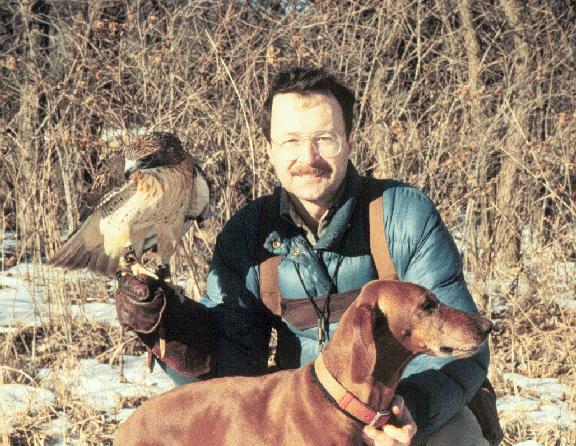Posted 5:25 p.m. Monday, Feb. 13, 2012
 [/caption]
Climate change and the growing list of endangered species are the types of issues that keep Stanley Temple awake at night. The professor emeritus of forest and wildlife ecology and environmental studies at UW-Madison says his field could be perceived as depressing. However, he is hopeful. He hopes society will come to adopt the “land ethic” of his famous academic predecessor — Aldo Leopold.
For 32 years Temple held the UW-Madison position previously occupied by Leopold. He knows a lot about the legendary environmentalist who believed in a land ethic that fostered a sense of belonging to the land rather than dominating it and regarding it as a commodity.
Temple, now a senior fellow with the Aldo Leopold Foundation, led a discussion of a documentary film on Leopold’s life and how it is relevant in the world today. “Green Fire: Aldo Leopold and a Land Ethic for Our Time” screened on Feb. 9 in UW-L’s Centennial Hall.
Temple has worked on conservation issues in 21 countries and helped save some of the world’s rarest and most endangered species. But he says it’s not just environmental scientists like himself who need to be concerned about the world’s environmental problems. Considering the complexity of the problems, he says solutions should come from a variety of disciplines and everyone should play a part. He praised UW-L’s efforts to take an interdisciplinary approach by organizing a sustainability-themed year in 2011-12, which continues this spring through a series of sustainability-themed events and initiatives.
Temple says he became interested in conservation and wildlife ecology when he was a young boy and an avid bird watcher. His passion for wildlife and nature continue today, and that’s why he is concerned about big challenges such as climate change.
“It’s coming down the tracks fast, and we are not responding quickly enough to prevent a train wreck in the future,” he says.
It will affect not just people, but cause irreparable damage to the natural world and wildlife species, he says. For instance, Temple has found that some species of birds in Wisconsin are not adapting their migratory patterns to climate change. This has given a competitive edge to other birds that do adapt and ultimately means population declines for species that don’t.
Temple says people sometimes ask him “What would Aldo Leopold have said?” about modern environmental issues. He says we can’t be sure, but we can predict how he would have approached many of today’s problems — by using ethics.
“People are accustomed to following ethical guidelines for coexisting in a human community. Leopold pointed out that we also live in a natural community and need to adopt ethical standards for living in harmony with the land, water, plants and animals there,” he says.
[/caption]
Climate change and the growing list of endangered species are the types of issues that keep Stanley Temple awake at night. The professor emeritus of forest and wildlife ecology and environmental studies at UW-Madison says his field could be perceived as depressing. However, he is hopeful. He hopes society will come to adopt the “land ethic” of his famous academic predecessor — Aldo Leopold.
For 32 years Temple held the UW-Madison position previously occupied by Leopold. He knows a lot about the legendary environmentalist who believed in a land ethic that fostered a sense of belonging to the land rather than dominating it and regarding it as a commodity.
Temple, now a senior fellow with the Aldo Leopold Foundation, led a discussion of a documentary film on Leopold’s life and how it is relevant in the world today. “Green Fire: Aldo Leopold and a Land Ethic for Our Time” screened on Feb. 9 in UW-L’s Centennial Hall.
Temple has worked on conservation issues in 21 countries and helped save some of the world’s rarest and most endangered species. But he says it’s not just environmental scientists like himself who need to be concerned about the world’s environmental problems. Considering the complexity of the problems, he says solutions should come from a variety of disciplines and everyone should play a part. He praised UW-L’s efforts to take an interdisciplinary approach by organizing a sustainability-themed year in 2011-12, which continues this spring through a series of sustainability-themed events and initiatives.
Temple says he became interested in conservation and wildlife ecology when he was a young boy and an avid bird watcher. His passion for wildlife and nature continue today, and that’s why he is concerned about big challenges such as climate change.
“It’s coming down the tracks fast, and we are not responding quickly enough to prevent a train wreck in the future,” he says.
It will affect not just people, but cause irreparable damage to the natural world and wildlife species, he says. For instance, Temple has found that some species of birds in Wisconsin are not adapting their migratory patterns to climate change. This has given a competitive edge to other birds that do adapt and ultimately means population declines for species that don’t.
Temple says people sometimes ask him “What would Aldo Leopold have said?” about modern environmental issues. He says we can’t be sure, but we can predict how he would have approached many of today’s problems — by using ethics.
“People are accustomed to following ethical guidelines for coexisting in a human community. Leopold pointed out that we also live in a natural community and need to adopt ethical standards for living in harmony with the land, water, plants and animals there,” he says.